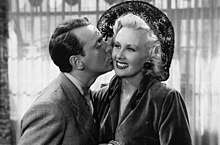The Chaste Libertine
The Chaste Libertine (German: Der keusche Lebemann) is a 1952 West German comedy film directed by Carl Boese and starring Georg Thomalla, Joe Stöckel and Grethe Weiser.[1] It was based on a popular stage farce of the same title by Franz Arnold and Ernst Bach which had previously been turned into the 1931 film The Night Without Pause.
| The Chaste Libertine | |
|---|---|
 Georg Thomalla and Dorit Kreysler | |
| Directed by | Carl Boese |
| Produced by | Artur Brauner |
| Written by |
|
| Starring | |
| Music by | Michael Jary |
| Cinematography |
|
| Edited by | Johanna Meisel |
Production company | |
| Distributed by | Prisma Film |
Release date | 17 July 1952 |
Running time | 94 minutes |
| Country | West Germany |
| Language | German |
It was made at the Spandau Studios of Artur Brauner's CCC Films. The film's sets were designed by Emil Hasler and Walter Kutz.
Synopsis
When his wife suspects Julius Seibold her circus-owning husband of having an affair, he tries to allay her suspicions by suggesting that it is really his young assistant Max who is having a relationship with the woman, and that he is in fact a playboy. This invented lifestyle in turn attracts the Siebold's daughter to Max.
Cast
- Georg Thomalla as Max Stieglitz
- Joe Stöckel as Julius Seibold
- Grethe Weiser as Regine Seibold
- Marianne Koch as Gerty Seibold
- Karl Schönböck as Dr. Fellner
- Dorit Kreysler as Rita Reiner
- Ethel Reschke as Dolly
- Rolf Weih as Riemann
- Ursula Herking as Anna
- Bully Buhlan as Singer
- Wolfgang Jansen
References
- Holmstrom p.209
Bibliography
- Hans-Michael Bock and Tim Bergfelder. The Concise Cinegraph: An Encyclopedia of German Cinema. Berghahn Books, 2009.